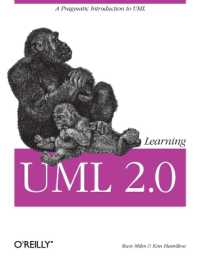- ホーム
- > 洋書
- > 英文書
- > Computer / General
Full Description
This is a book about isomorphisms 0/ types, arecent difficult research topic in type theory that turned out to be able to have valuable practical applications both for programming language design and far more human centered information retrieval in software libraries. By means of a deep study of the syntax of the now widely known typed A-ca1culus, it is possible to identify some simple equations between types that on one hand allow to improve the design of the ML language, and on the other hand provide the basis for building radically new information retrieval systems for functional software libraries. We present in this book both the theoretical aspects of these researches and a fully functional implementation of some of their applications in such a way to provide interesting material both for the theoretician looking for proofs and for the practitioner interested in implementation details. In order to make it possible for these different types of readers to use this book effectively, some special signs are used to designate material that is particularly technical or applied or that represents a digression. When the symbol appears at the beginning of a section or a subsection, it warns that the material contained in such section is particularly technical with respect to the general level of the chapter or section where it is located. This material is generally reserved to theoreticians and does not need to be read by the casual reader.
Contents
1 Introduction.- 1.1 What is a type?.- 1.2 Types in mathematical logic.- 1.3 Types for programming.- 1.4 Exploring typed ?-calculi.- 1.5 The typed ? -calculi used in this work.- 1.6 The Curry-Howard Isomorphism.- 1.7 Using types to classify and retrieve software.- 1.8 When are two types equal?.- 1.9 Isomorphisms and the lambda calculus.- 2 Confluence Results.- 2.1 Introduction.- 2.2 Extensionality.- 2.3 Overview.- 2.4 Confluence.- 2.5 Weak normalization.- 2.6 Decidability and conservative extension results.- 2.7 Other related works.- 3 Strong normalization results.- 3.1 Normalization without ?2 on gentop n.f.'s.- 3.2 Normalization without ?top and SPtop.- 4 First-Order Isomorphic Types.- 4.1 Rewriting types.- 4.2 From ?1???? to the classical ?1??.- 4.3 Using finite hereditary permutations.- 4.4 The complete theories of ?1??? and ?1???.- 5 Second-Order Isomorphic Types.- 5.1 Towards completeness.- 5.2 Characterizing canonical terms.- 5.3 Completeness for isomorphisms.- 5.4 Decidability of the equational theory.- 5.5 The complete theories of ?2??? and ?2???.- A Properties of n-tuples.- B Technical lemmas.- C Miscellanea.- 6 Isomorphisms for ML.- 6.1 Introduction.- 6.2 Isomorphisms of types in ML-style languages.- 6.3 Completeness and conservativity results.- 6.4 Deciding ML isomorphism.- 6.5 Adding isomorphisms to the ML type-checker.- 6.6 Conclusion.- 6.7 Some technical Lemmas.- 6.8 Completeness.- 6.9 Conservativity.- 7 Related Works, Future Perspectives.- 7.1 Equational matching of types.- 7.2 Using equational unification.- 7.3 Extending the paradigm.- 7.4 Future work and perspectives.- Citation Index.








